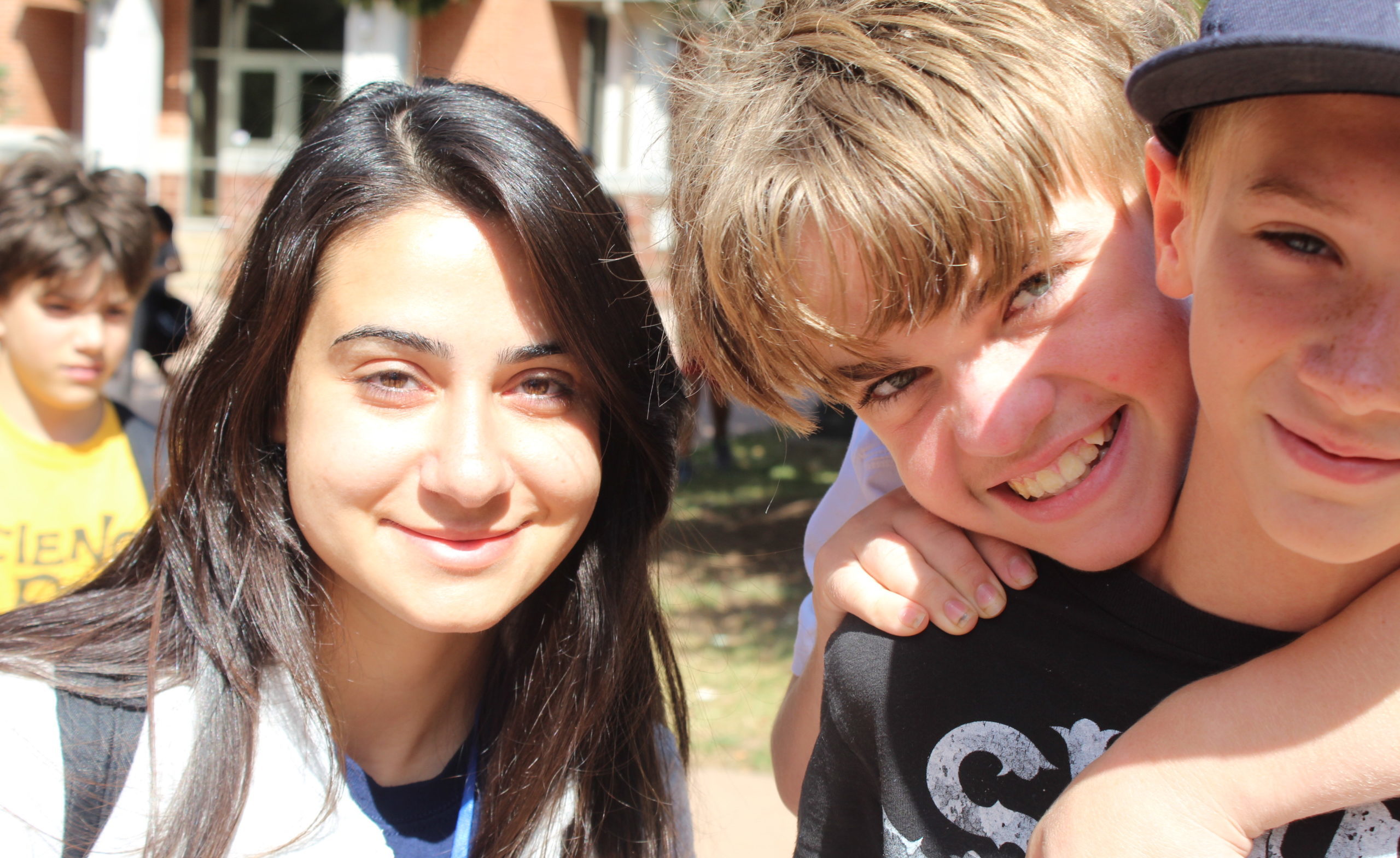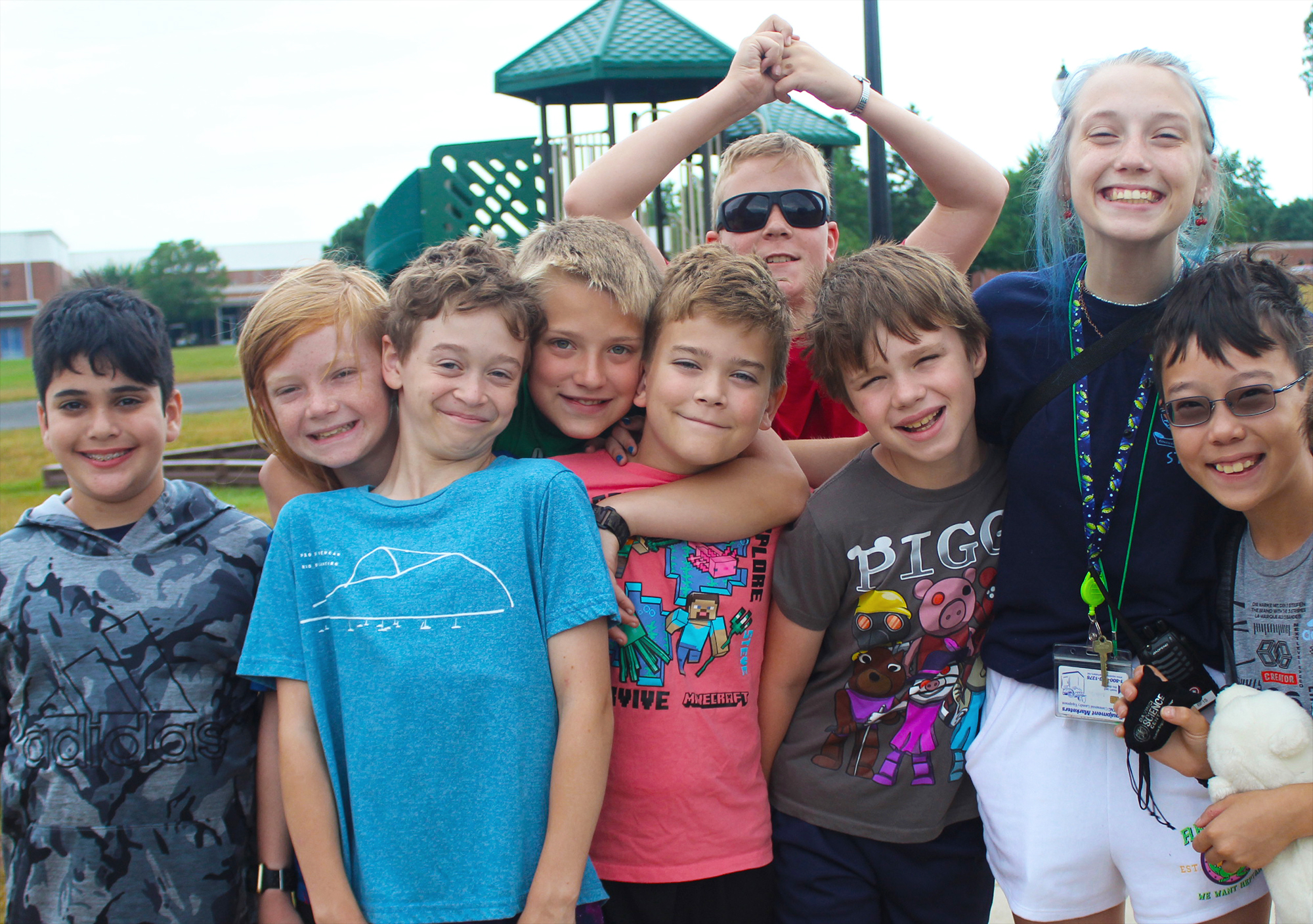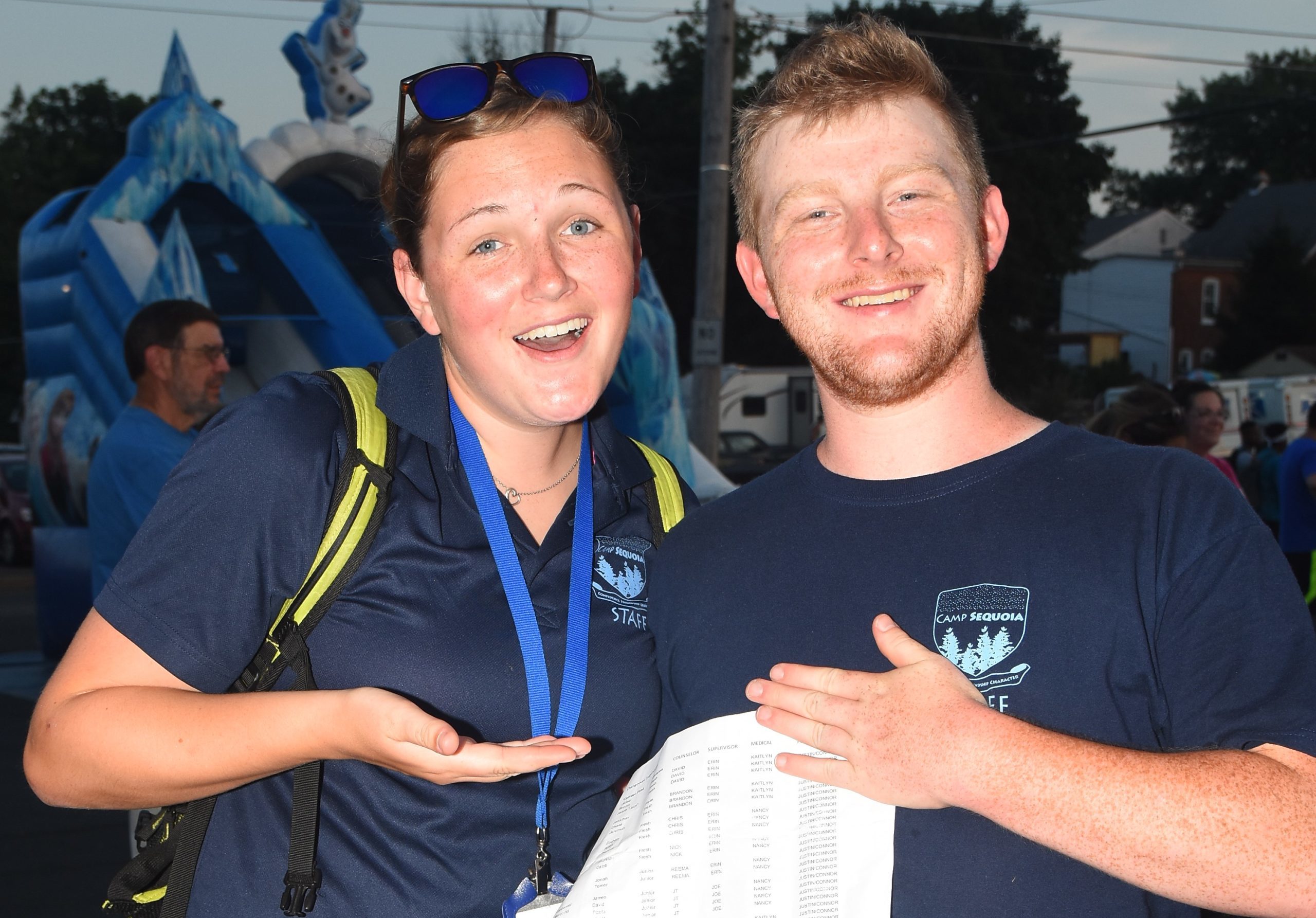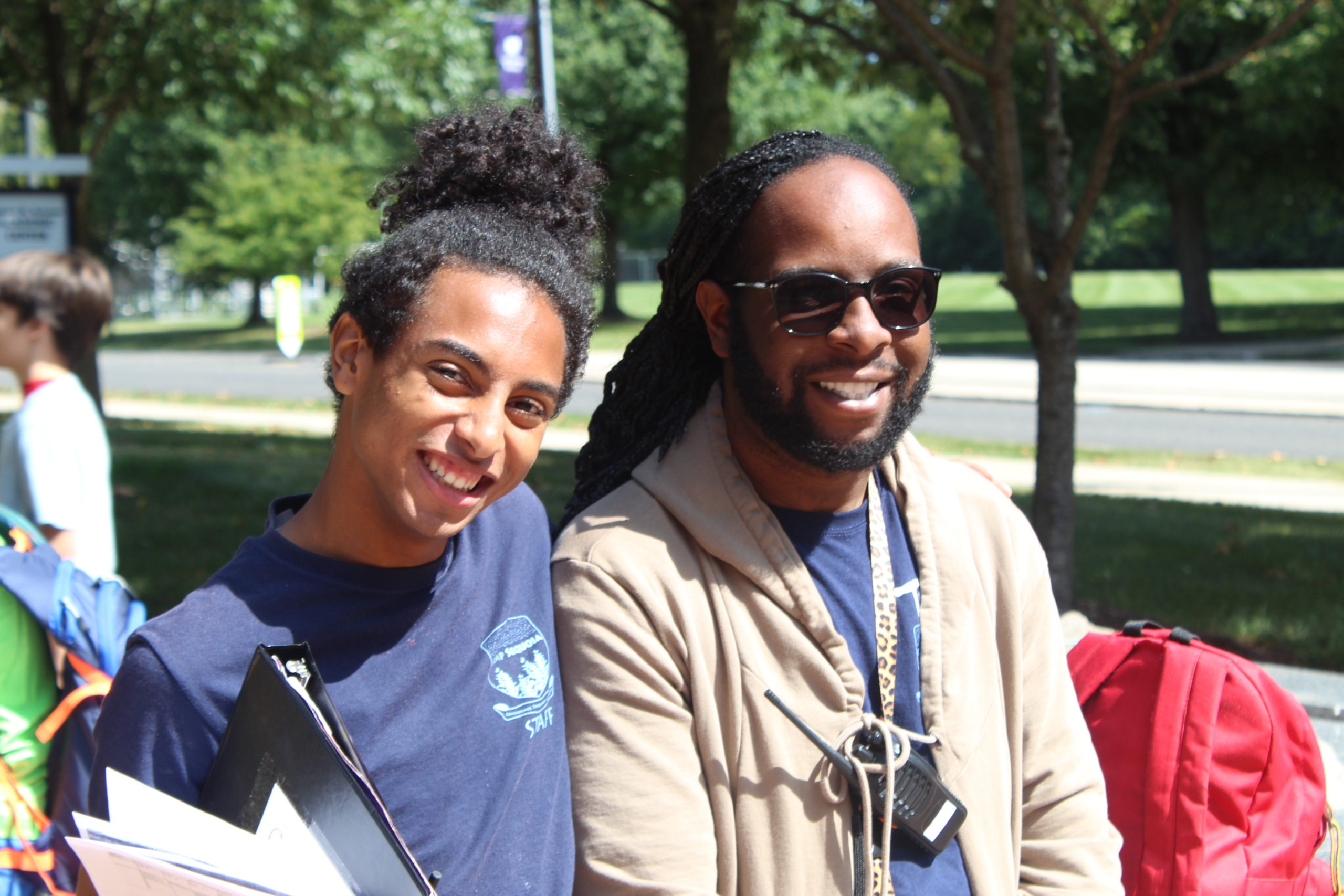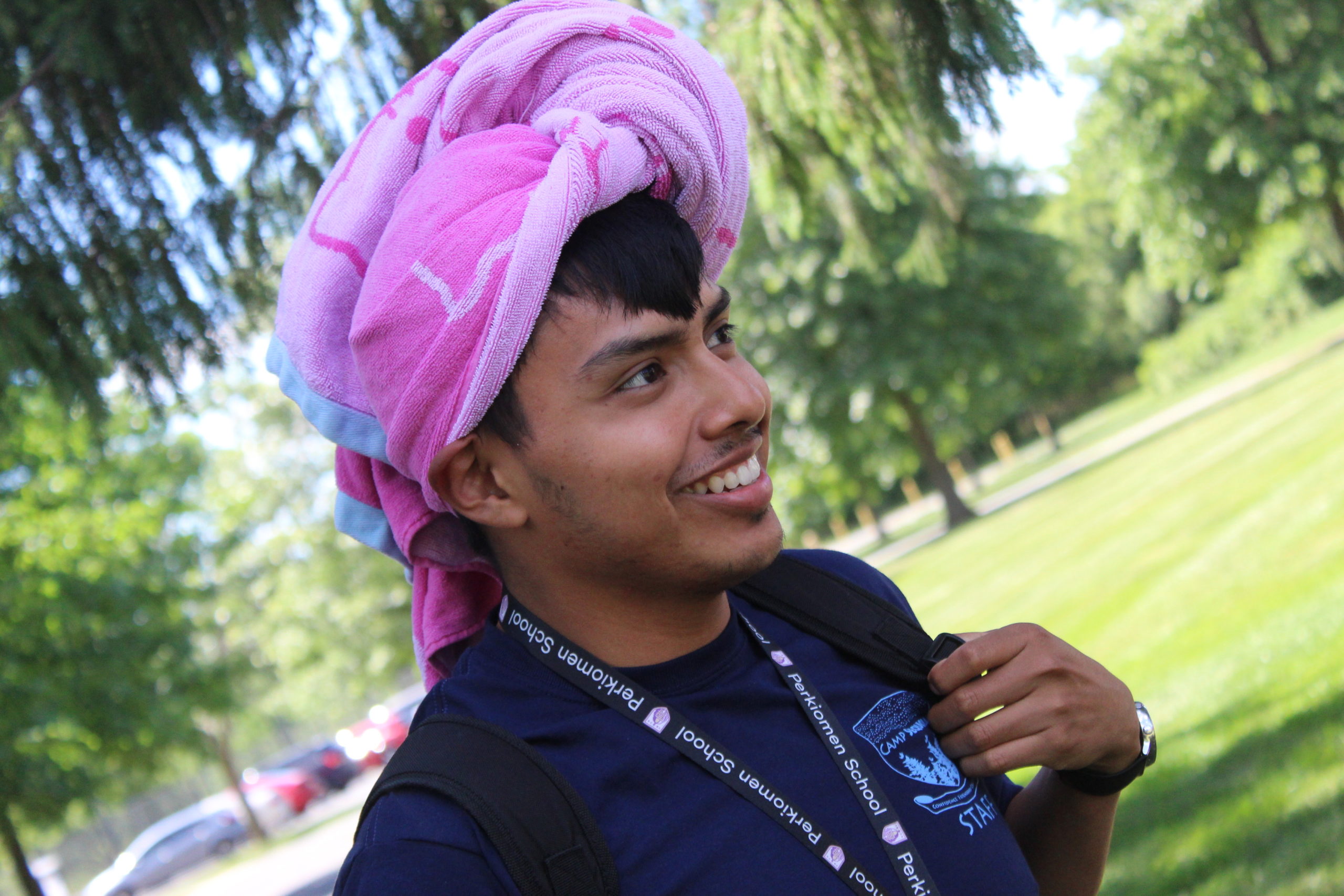Knowing that everyone processes information differently, we have an abbreviated and more in depth version of the staff handbook. We encourage everyone to glance over the following information, then invest some extra time before camp reviewing the full handbook.
Handbook Highlights
@SequoiaArrival
Check with the office on your flight. We do airport pickups day and night. But not too late, like 3 am–you’ll have to wait if you arrive then. Philly airport, or drive a car, either way, camp’s not to far.
@SequoiaBags
Emotionally baggage should not be packed, instead a duffle or small backpack. Our packing list is pretty bland–like time spent counting grains of sand. Check out the list, check it twice, you won’t need any clothes too nice. Feeling dirty? That’s ok. Laundry on site is steps away. What should I wear? I have no clue– camp clothes shouldn’t reveal too much of you.
@SequoiaProgram
Routines matter, schedules too. Have a plan of what to do. On days of rain or sun or gross, lesson plans should not be verbose. They should just plainly engage our kids, no matter what the weather is.
@SequoiaTeaching
Inquiry-based, hands-on learning, more of your skills the kids are yearning. Active engagement is the key–structure your lessons intentionally.
@SequoiaExpectations
A prize package from Mr. Beast– not from us– no not that vibe, but we’ll do more than keep you alive. We’ve got a staff lounge, incentives too. Please do the work you were hired to do. Some days will be hard and others easy, but our humor– always cheesy.
@SequoiaCampers
Our kids are the reason we are here. Focus on them, let’s be clear. Our staff training will reduce your fear, as long as your brain (and not just your body) is attentive here. When training is over before kids come, we will assess your knowledge and pay you some.
@SequoiaSalary
Our staff our great, our kids our too– and you’ll be paid for what you do. When staff training is complete you’ll get a stipend for your feat. $200 of your summer contract in your bank, enough to fill up your gas tank. You’ll be paid mid-camp and at the end too, as you do the work you do.
@SequoiaPolicies
Our structure and rules help keep us secure. To be clear and not demure– be very mindful of what you bring and do when you are here. Our intro video abounds with tips on what’s in and out of bounds.
@SequoiaRelationships
Friends are fun, sometimes more is great– we have rules on who you can date. Casual hookups count here too, there are some things you shouldn’t do. Your room with roommate is meant for two. If others cross your bedroom door, kids will assume there’s something more. It isn’t fair to you or them, so non-residents aren’t allowed within. For all staff on payroll it is true– these guidelines ALL apply to you. No matter how much rizz they’ve got, in your dwelling they can’t be caught. No means no and should be spoken– we don’t want anyone feeling broken. If you are in a leadership position, for line staff attention you can’t be fishing. If you have questions, or need more deets– the Camp Director will be happy to meet.
@SequoiaTimeoff
A day of rest is not enough– working at camp can sure be tough. We offer staff more than a day– 32 hours to get away. We encourage rest and whimsy too, come back on time–the team needs you.
@SequoiaTech
Swipe right, swipe left we do not care, just don’t be on your phone when kids are there. If there is a thunder rumble, you should not be caught on Bumble. After bedtime or when you wake or even on your daily break are times to scroll or just unwind– so on your feed you’re not behind.
@SequoiaEmergencies
If things go wrong, and sometimes they do– being calm will pull you through. Staff training will teach you all you need, or our extended handbook you can read.
@SequoiaSocials
We hope and trust Camp will be fun and it’s ok to share what you’ve done. There are some guidelines (nothing too wild) but do not post anything about a child. Also, be positive and not sus and you’ll get no beef from us. Don’t be a simp or dox, drag or roast– we hate all of these the most.
@SequoiaFail
If you are slacking or just get busted, we need to make sure you can be trusted. A verbal warning, written too– or in some cases we’ll bid adieu.
@SequoiaDeets
Our Version #2 gives all the deets– on ethics, logistics and staff treats. Be sure to scroll and take a look– even if it is a mini-book.
@SequoiaSign
When you are done (please take your time), there is an acknowledgements form to sign.
Dear Staff,
Welcome to what will likely become one of the most rewarding and most difficult experiences of your life. My goal is to make profound positive impact in the lives of our youth. Furthermore, I endeavor to provide staff with a level of support and positive reinforcement second to none in the field of residential camping experiences. Make no mistake; you are a selected group, chosen to engage in one of the most meaningful professions imaginable. In this document and throughout the orientation, you will find information, examples, and support designed to give you appropriate tools to deal with situations that may arise. Camp Sequoia however, isn’t all about typical situations and as such, there is a simple statement that will supersede and augment all of the information that you will be given in other forms. Remember this statement throughout the experience and you will on your way to keeping our campers safe and happy.
YOU WERE HIRED FOR YOUR GOOD JUDGMENT: USE IT OR ASK FOR HELP
It is with great excitement that I welcome you to Camp Sequoia. This summer will be a unique opportunity, as you will have an integral role in creating a special experience that our campers will remember for the rest of their lives. Starting as a camper at age 8 and rarely absent from this type of transformative experience since, has taught me that each summer brings its own challenges and opportunities. This summer is no different. In order to best BE PREPARED to provide a quality experience you need to be supported by camp management. This letter is my pledge to do just that, through open communication and periodic incentives for high performing staff. You are responsible for being the staff member that changes the life of a young man for the better. I am responsible to see that you have the training and tools to be able to do this. When I support you, you are able to provide a superior experience for our campers.
Regardless of your specific job at camp, you will have an instrumental role in establishing our camp culture and creating the foundation for Camp Sequoia’s future. Together we will create an unforgettable summer for our campers and for each other. Our goal is for our campers to leave camp with some new friendships while feeling more self-confident, more socially connected and more socially aware of themselves.
As you begin the staff training process, please take a moment to reflect on why you are here, which staff member made a difference in your life as a camper or what mentor taught you something you will never forget. Take time to consider how you will be that person this summer for our campers.
Brian Lux, Director of Camp Sequoia

THE PHILOSOPHY AND PURPOSE OF CAMP STAFF
Staff members come to us with assorted knowledge, skills, abilities and expertise. You may have varied interests, hobbies, personalities, religions, and personal habits (hopefully none that offend your roommate), but you share one creed…to help every camper in a meaningful way. This means that the idea of servant leadership, putting the needs of your campers above your own as together we pursue the growth and wellbeing of our camper community.
Staff members are a composite group. You must have the energy of an erupting volcano, the memory of an elephant, the understanding of clergy, the wisdom of a judge, the tenacity of a spider, the patience of a turtle trying to cross the I-476 on a Sunday afternoon, the decisiveness of a general, the diplomacy of an ambassador, and the common sense of a member of the Supreme Court (at least most days). They must remember that campers learn by specific tasks by doing. Staff must also be perceptive and have a sincere interest in the whole person whether at the pool, archery range, art room or in the dorm.
Staff members must possess knowledge but most certainly they must possess love and deep abiding appreciation of and respect for growth of our campers, both individually and as a cohesive group. They must understand the camper who at times has the energy of a double shot espresso, the stubbornness of a mule, the antics of a monkey, the spry of a grasshopper, the curiosity of a cat and sometimes the sly demeanor of a fox.
Staff members must know how to spot things: the tendency toward homesickness of a first-year camper; how to handle your own day-to-day problems; who to report to in case of trouble; and which decisions one can make for oneself, and which decisions we refer to higher-ups.
Staff members should always go the extra mile to make camp even more enjoyable. Remember that you are there to work and not to look upon your assignment as your own personal vacation. Remember: You are hired to see that your division or activity is the best one in camp. In spite of your own likes and dislikes, continually smile, be steadfast, truthful, and understanding. Keep plugging away and you will be remembered long after others are forgotten and someday, somewhere, some young man will come up to you and say, “Hi! Remember me?”
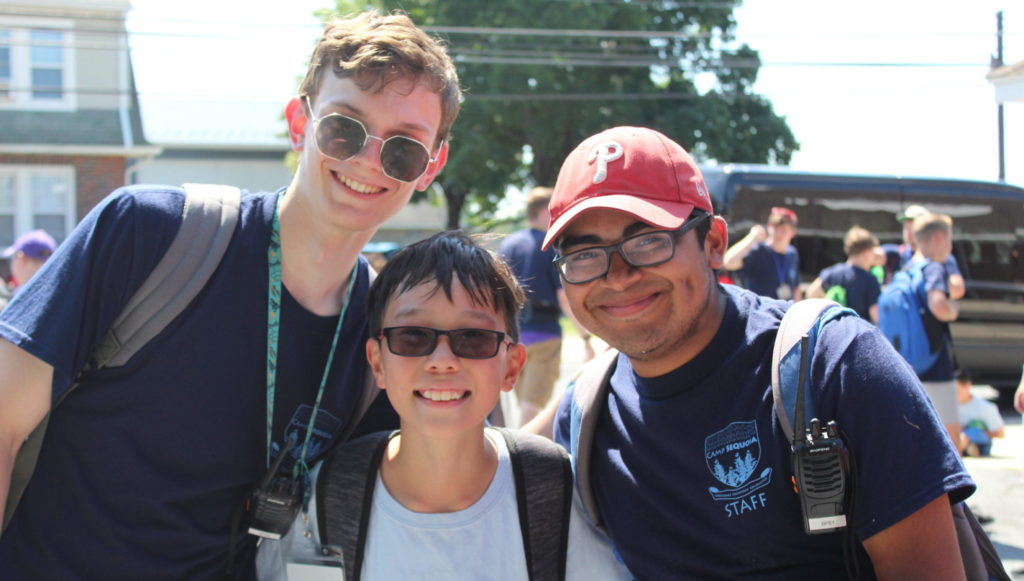
RESEARCH-PREPARATION-EXECUTION-EVALUATION FOR TEACHING
RESEARCH: You might be responsible for archery, art, STEM, or Movie Making. Your first step is to learn as much about the subject as possible. Consult available literature beyond your own expertise. Talk with others about the subject. Read up from other material about the subject. Glean information from returning staff and the directorate. THINK! Put ideas down on paper. Try the skills that you are teaching (on your own) until you have mastered them. Know what you want your campers to learn.
PREPARATION: Take the material you have gathered and begin to organize yourself early to develop an interesting presentation activity. Check what you are going to do first and intentionally plan what you will say. Find out the ability and review developmental appropriateness of the group (this will vary across age groups). Plan to have the activity start as soon as the first person arrives. Have questions ready to get the group thinking along with you. Gather all props and materials before the “gang “arrives. Plan the amount of time required for group practice of the skills. Have games ready that put the skill work and create shared interest. Have the closing of the session prepared so the group will leave wanting to come back because it was fun and a benefit to all.
EXECUTION: If you have prepared well in advance, half the work is done. You now put your plan to work. Run through your prepared plans BUT be prepared for emergencies and last minute refinements. Watch for interest build-up, or lag in the group. Help those who don’t catch on. Don’t make anyone look stupid-it can backfire. Ask questions. Be sure to answer questions and don’t bluff. Keep alert and alive and keep the show moving. Use any ‘experts’ in the group, but don’t lose control of the group—you don’t have to be up front to be in control.
EVALUATION: Sit down as soon as possible, after the group has gone, and think back over what happened.
- What went over well?
- What went wrong?
- Where was your plan slow or faulty?
- Was the group attentive and interested?
Write your observations down and plan to do something about them before your next session. Get help from others with your preparation and execution. Remember, everyone wants to do a good job—we are all on the same staff, here for the same purpose. As appropriate involve campers in the debrief at the end of each teaching session.
TIME BALANCE IN TEACHING A SKILL
No one can learn a skill except by doing; therefore, most of our time must be spent in practice. The proper time balance is:
- Explanation (Hearing) 10% of the time
- Demonstration (Seeing) 15% of the time
- Practice (Doing) 75% of the time
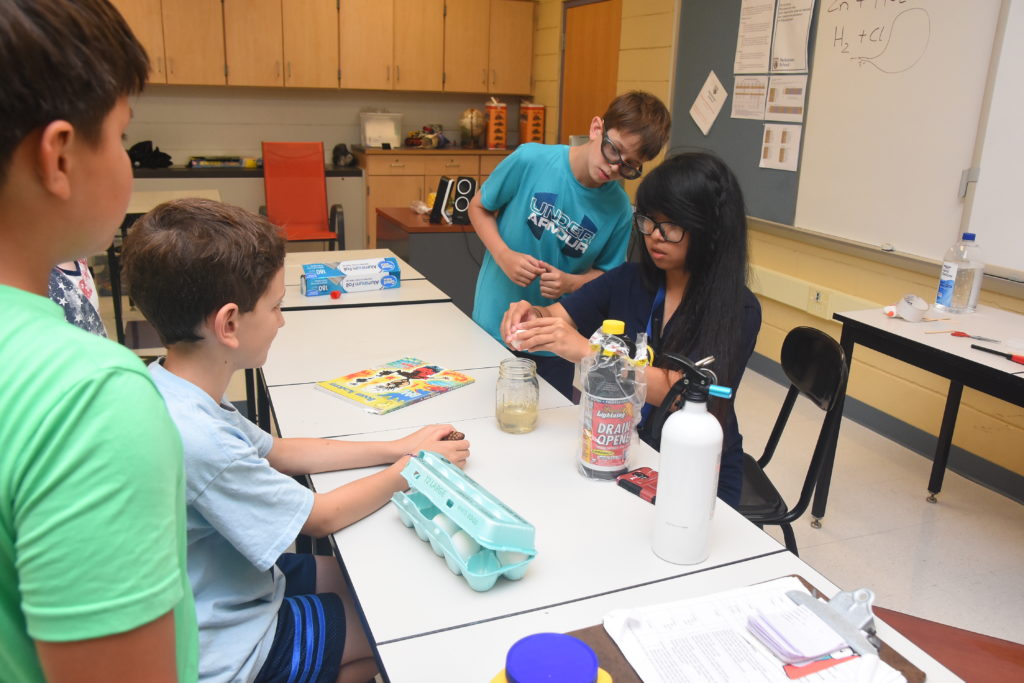
TIPS:
- Be able to perform the skill well yourself.
- Review your experience learning the activity yourself and work out a series of steps teaching it to different age groups.
- Keep the instruction personal by working with an individual or small group and letting them teach others.
- Size up your audience—both abilities and personality traits— both impact learning.
- If the learner is not familiar with the skill, go slowly. Insist on accuracy first, and then speed (if speed is a factor.)
- Don’t interfere with the learners trying to do it on their own. Don’t interrupt their efforts unless they bog down or go off on the wrong track or are acting unsafely.
- Let them make mistakes if this will help them learn but do point out mistakes tactfully.
- Encourage the learners by making remarks on their progress, pointing out the completion of each step and remarking on the steps they have done well.
- Urge them to practice and teach someone else.
- Use all of the resources at your disposal to ensure that campers have a dynamic, intentional, and meaningful experience at your activity.
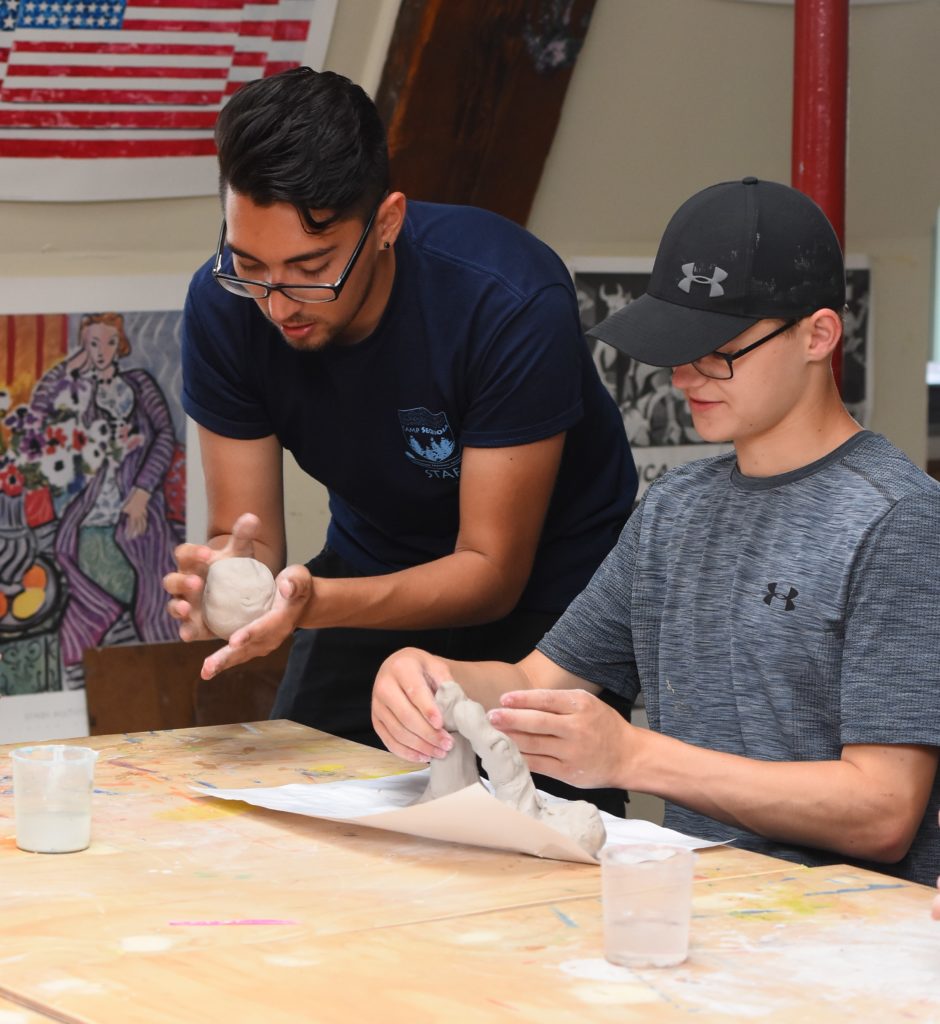
CAMP LOGISTICS
Arriving to camp by car:
You may bring a car to camp, there’s plenty of parking. When you arrive, you will register your vehicle (if you haven’t done so already) and we will help you unload. Please arrive to general staff orientation by 1:00 P.M. Specific dates and instructions for arriving at leadership and general staff training will be sent out to everyone before arrival, so keep an eye out for that email detailing arrival. We also host a pre-arrival zoom to review what to expect when you arrive, what to pack, and what to prepare.
Arriving to camp by plane:
If you will be flying into camp, you can fly into either Philadelphia International Airport (PHL) or Lehigh Valley Airport (ABE). Flights to Lehigh Valley are limited and tend to be more expensive than flights to Philadelphia. We will pick you up at the airport. We ask that you arrive the morning of or the night before staff orientation starts Please refer to your arrival date, listed on your contract and DO NOT book round trip flights before speaking with Reema!
If you find a screaming deal into another airport, let us know first and we may be able to connect you with staff coming by car from that part of the world. Alternatively, public transit can get you from EWR to PHL if you want to explore that option— although it is several hours of trains. Let us know your arrival time and we will arrange to meet you at the airport. Understand that we will make two airport runs for staff. Once we have arrival details for everyone, we will advise you when we can pick you up. The late run will depart when all flights have landed for the evening (the night before training begins) so you will not be stranded. This is because we love you and don’t want you to sleep in an airport. We will meet you outside of the baggage claim area for your airline and will provide you with the cell number of the staff member who will be meeting you. If your flight gets in early, you may need to wait in the airport for a while. There are many stores and places to eat within Philadelphia airport in terminals B & C.
You may ship things to camp if you’d like as well. We can collect packages scheduled to arrive after 6/15. The address for shipping is:
Your Name
Camp Sequoia
200 Seminary St.
Pennsburg, PA 18073
WHERE WILL I LIVE AT CAMP?
Upon arrival all of our staff will live in one dorm during staff orientation before (potentially) moving into another location just before the campers arrive. During camp our male staff lives in the dorms with our campers and will share a room with another staff member. Female staff will typically live in separate shared accommodations, and will also have a roommate. All dorms have a common room and preload card laundry for most of the dormitories. You will be assigned to a specific division (age group at camp) who you will work with, eat meals with etc. Even if you are an Activity Specialist, you will be assigned to a division and your responsibilities include working with the General Counselors in your division.
WHAT HAPPENS AT STAFF ORIENTATION?
During the staff orientation we will have different sessions to help you to learn how to work effectively with our campers and get you as prepared as possible for your job. We will have some separate sessions for our activity specialists where we’ll teach you how to structure your periods for each division (age group) at camp. You will also learn about Social Cognitive Skills and Building Frustration Tolerance to help you understand how we integrate these concepts into our work with the campers in all aspects of camp. We also will unpack our camper’s belongings and organize their rooms so they feel comfortable once they arrive at the end of staff orientation. You will move into your “summer home” with the division to whom you are assigned towards the end of staff orientation as well.
One important part of staff orientation is getting to know each other. It is natural and expected that you might feel somewhat nervous or uncomfortable at first until you start to get to know everyone. It is extremely important to hang out with each other during down times of orientation and not totally seclude yourself with your cell phone, laptop, etc. Obviously hiding in the staff lounge with the lights out is not a good way to meet all of our staff. Our staff becomes very close during the summer and this time during staff orientation week is the time for you to enjoy each other and build those connections as a meaningful foundation for a great summer with your colleagues and support network.
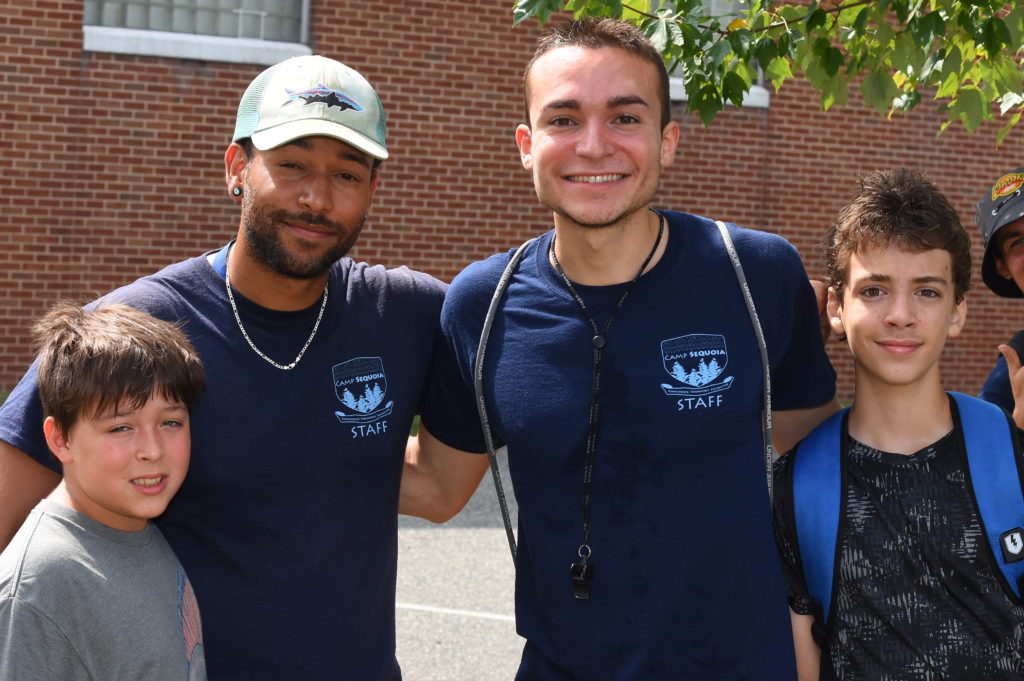
WHAT DO I NEED TO DO TO PREPARE FOR CAMP?
You will have some required reading to do, and several videos to watch. We expect that you have viewed and understand these materials prior to camp. (We recommend taking notes, as we will be discussing during training, and there will be a test at the end of training to ensure everyone understands the material 🙂
If you’re an Activity Specialist, you should prepare a list of supplies you think you’ll need and start getting some ideas together for lesson plans. Keep in mind that you will see each age group at camp so lessons should be planned accordingly. We need to have your requested supply list sent to us in a word document by March 30th at the very latest.
What can I expect from my experience working at Camp Sequoia?
It is okay to ask this question. We want you to be as prepared as possible for an exciting, challenging, and rewarding summer experience. We want to help you to create realistic expectations for the summer and to be prepared for some difficult times. However, this summer will be an amazing learning opportunity where you will develop your leadership skills. In addition, you will become more confident and competent in effectively managing a variety of situations with some really incredible campers and staff.
Some things you can expect:
- To make meaningful friendships that will be unique since no one in your life outside of camp will truly be able to understand this experience.
- The first week of camp may be very challenging as well as exhausting while the kids adjust to Don’t become discouraged; it will get easier after the first week.
- You’re going to work long hours and will probably give more of yourself than you have ever given in any However, you will quickly discover that you are capable of much more than you ever realized.
- You cannot do this alone! You will need to ask each other for help at some point during the We are a team and can only be successful if we provide each other with support and assistance. Asking for help doesn’t make you weak; it makes you a better counselor.
- You are going to be amongst a senior staff who is very experienced. Take advantage of their expertise. Their job is to support you. Together they have over 50 seasons of working with Camp Sequoia and can be a great asset to you.
- Our staff needs to always come across as a unified front. If campers receive mixed messages from staff, it makes it more difficult for everyone to do their job
- The more you take time to get to know your campers and show them your enthusiasm, the more likely campers are to be cooperative and mirror your energy. Counselors completely set the tone for campers. If you’re having fun, they’ll have fun.
UNDERSTANDING OUR CAMPERS
- Most of our campers are very intelligent and do well in school.
- Our campers ages 7-10 have a faster and easier adjustment to camp than the older campers typically. Campers ages 11-17 could have a longer adjustment.
- Our campers struggle with making and keeping friends. Some of our campers have a harder time with starting conversations and understanding how to be part of a social group. Other campers may have an easy time making friends but have trouble with keeping friends.
- Many of our campers have trouble with emotional regulation and tend to make a big deal out of small problems and/or overreact to small problems.
- Some of our campers can be rigid; they have trouble with being flexible when being part of a group and “going with the flow”.
- Routines, structure, consistency, and knowing what’s happening ahead of time all are very important for all our campers. Change can be difficult for them, particularly unexpected changes.
- Many of our campers are more comfortable being with people older or younger than them. They can be least comfortable with people their own age.
- Most of our campers will be psychologically/emotionally younger than their chronological age.
- The majority of our campers struggle to understand their own emotions and other people’s perspectives (the thoughts, feelings, experiences, and intentions of others). This is the cause of almost all conflicts between campers.
- Many of our campers are over-dependent on their parents and have limited experience being independent. As a result, many of them will feel very anxious and unsure about their ability to be successful being away from home. This may come off as excessive homesickness, or an “I don’t want to be here” mindset when they first arrive at camp. They will need our help and encouragement to realize they are capable of succeeding on their own.
- Don’t worry about offending our campers by redirecting them or using the Social Thinking concepts you will learn. This is critical to helping them improve their social skills.
- Kids with social skill deficits often say inappropriate/ offensive things. This is part of their lack of awareness and isn’t intended to offend, or may be an attention seeking coping mechanism because they don’t understand how to be interesting to others in socially appropriate ways. However, it’s important to be direct and point out how their words might affect others.
- You will need to work at making sure certain campers don’t isolate themselves from other campers. You will sometimes need to help facilitate conversation by bringing up topics that can be discussed in a group.
- Some of our campers will act very differently the first few days of camp because they are extremely anxious and uncomfortable. As they become more comfortable, they will start to act more like themselves.
- Many of our campers easily get “stuck” when things don’t go the way or when something is bothering them. They will have trouble moving on and may resist participating in an activity. They can often perseverate on things they perceive as being negative. It’s important to not give them much opportunity to talk about what they’re stuck on, change the subject, and help them move on.
- The sooner you establish rules, expectations, and the fact that you are in charge, the easier time you will have working with our campers.
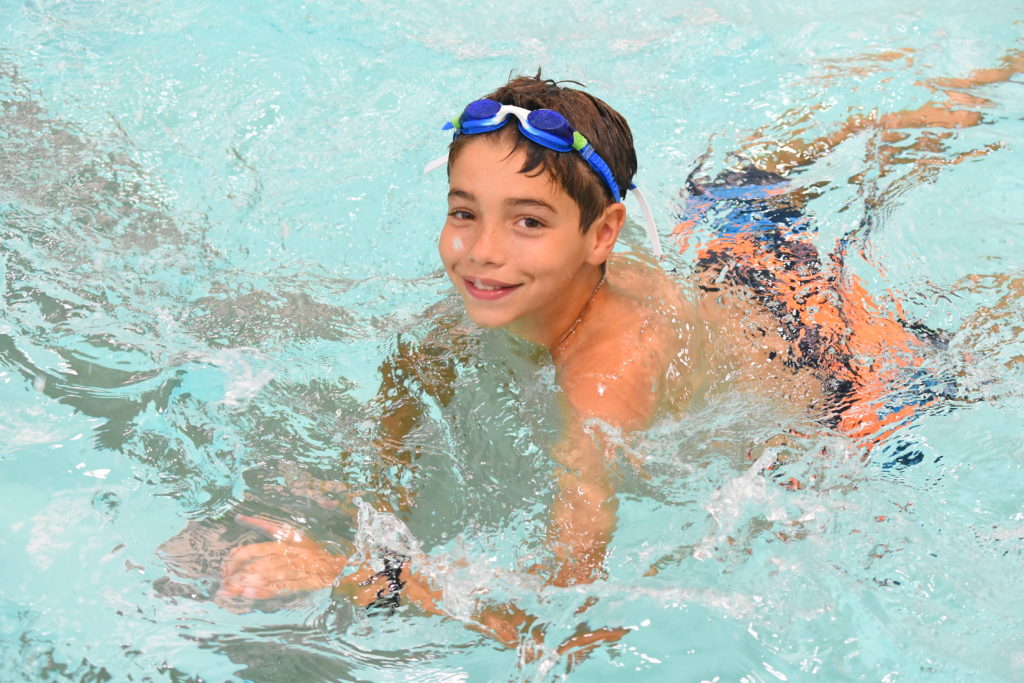
GENERAL INFORMATION AND POLICIES REGARDING CAMP SEQUOIA
- Our goal is for our campers to go home at the end of their stay healthy, happy, and wanting to return next summer. You are the key to making this happen. We all want camp to go well and run smoothly. One important way that you can help us is to make sure that there are NO SURPRISES. In addition to injuries, if something happens that you think we should know about, PLEASE REPORT THE MATTER TO A SENIOR STAFF MEMBER RIGHT AWAY. Beyond this reporting, please keep in mind the confidentiality of camp operations as an essential job function.
- Your responsibility for the day begins when you wake up and it ends when you are off duty or your O.D. shift ends (we’ll explain this at orientation).
- It is essential to always be calm and positive when dealing with campers. Yelling, cursing, or derogatory comments are never acceptable. If you need a break to “cool off” let a Senior Staff member know.
- You must report to ALL activities dressed appropriately, ready to participate and assist.
- Activity Specialists are responsible for planning and implementing lessons. General Counselors become assistants to the specialists and in some cases teach activities.
- Every accident or injury MUST be reported to the nurse.
- Drugs and alcohol are strictly forbidden. Any use at camp will result in immediate dismissal, as will any attendance at the camp while under the influence of alcohol or drugs.
- Smoking is not permitted on the Perkiomen School grounds. This includes e-cigarettes.
- No weapons of any kind are permitted (If you need something that could be construed as a weapon for a program area, please check with the directorate so we can ensure safe handling and storage).
- Pets or animals (alive or dead) are not allowed to be kept on campus. Do not bring animals with you to camp.
- An official Camp Sequoia t-shirt must be worn by all staff onsite and when traveling out of camp with campers. We will provide you with shirts, if you lose or damage a shirt (or just want an additional one) we will provide you with a new one at your expense ($10.00/per shirt).
- Everyone is employed for a six-week season plus staff orientation. This means that you will be paid for the 6 weeks you work and attend staff orientation as a condition of employment. Leadership staff should consult their contracts and dates for additional information.
- Please bring a clipboard with you to camp, you’ll find that it will be very useful.
- Gum is not permitted at camp for campers or staff. This is because the Director doesn’t like gum—and more importantly because it gets stuck places and that can become a hassle for everyone.
- You are welcome to bring personal sports equipment and electronics to camp, but please note our electronics policy with regards to use of electronics around campers. Sports equipment should be kept in staff-only spaces, in the office, or in the designated activity equipment storage area when not being used in said sport. Please note that we do not recommend bringing expensive or fragile possessions to camp, as the nature of working with children sometimes results in items getting broken. Camp Sequoia is not responsible should these items be lost or broken by a camper, staff member, or situation during the course summer. We recommend electronics have cases or protective coverings if you choose to bring them to camp with you.
- Photos and videos are frequently taken at Camp Sequoia. As part of your employment, you agree that Camp Sequoia has the right to use any images of you taken in its brochures as well as in electronic, video, print, display and other materials.
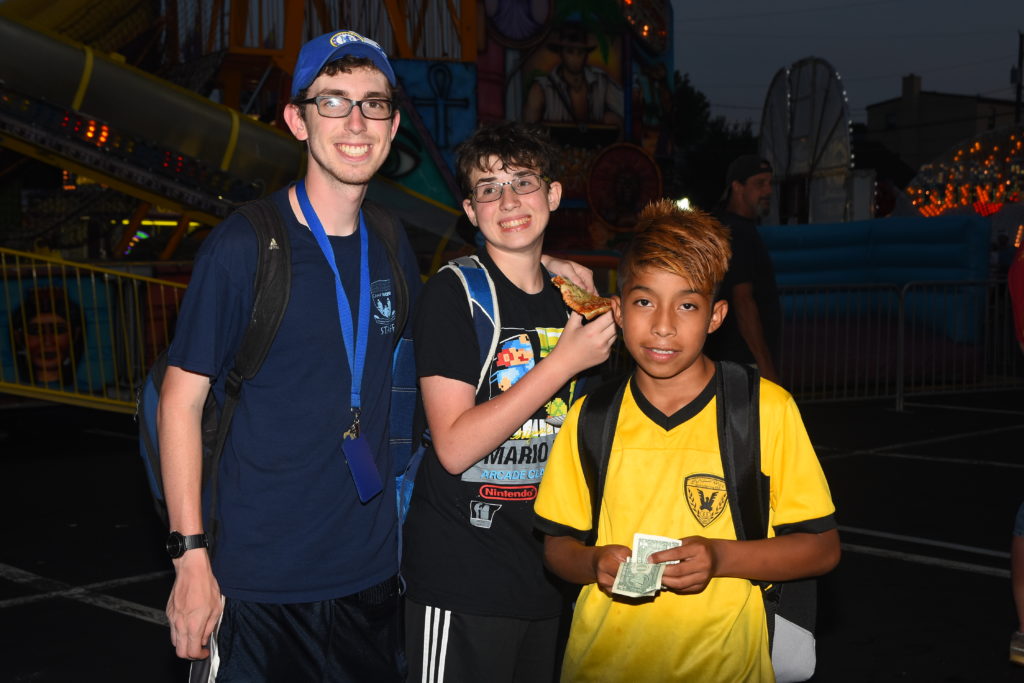
VISITORS
Your family and/or significant others are allowed to visit you at camp with prior consent from the Director. However, overnight guests are not permitted. Please understand that your job responsibilities come first and foremost, and visitors can be distracting to your ability to do your job to the best of your ability. That being said we ask that you do not take advantage of this policy, so we do not need to limit your visitation privileges. All visitors must register at the camp office. A member of the directorate will escort visitors around camp unless the Camp Director approves an exception. The Perkiomen School security staff will not allow any visitors onto campus without authorization and identification. If you have friends coming up to camp, they must meet you off campus on your time off unless they have been specifically approved in advance. Staff who attempt to have unauthorized visitors on site are subject to disciplinary action.
FOOD
NO NUTS OF ANY KIND MAY BE KEPT IN THE DORM, DUE TO SEVERITY OF NUT ALLERGIES. If you yourself are nutty, please advise a member of senior staff prior to camper arrival. Personal food (reasonable quantities that conform to our community standards) may be kept in dorm rooms but should not be eaten in front of campers and never shared with campers.
VEHICLES (SEE CAMP SEQUOIA VEHICLE REGISTRATION FORM)
- Counselors may bring their cars to camp, provided they are properly inspected, registered, insured, and parked in specified locations.
- All staff members that bring vehicles to camp must fill out a vehicle registration form (above).
- Campers do not ride in staff cars, except with written permission from the Camp Director.
- Camp Sequoia, LLC is not responsible for damage to vehicles in camp.
- Please bring an extra set of car keys with you as you never know when you might need them (trust us on this one).
Mail should be sent to the following address (only between 6/11-8/3):
Your Name
Camp Sequoia
200 Seminary St.
Pennsburg, PA 18073
The United States Postal Service offers this incredible service called “mail forwarding”. You can designate a change of address for the duration of your time at camp, which we highly recommend, as one of your background checks (the FBI Fingerprint Check) automatically sends to your home address. The best part? It only costs $1.10. You can set this up here:
DISCIPLINE OF CAMPERS
We have some great ideas and policies, but will talk about them with your input at staff orientation. For now, remember that we respect children and avoid criticizing in public. Below you’ll find some general guidelines for your review.
Good discipline is generally the result of strong leadership and a positive attitude. However, some campers will come to Camp Sequoia with patterns of disruptive behavior. Occasional misbehavior is part of human nature and must be dealt with in the growth process. All discipline at Camp Sequoia is administered with a view toward learning how one’s behavior affects others rather than punishment.
Discipline problems can and do occur at camp. Under no circumstances are campers to be
- Physically threatened
- Subject to corporal punishment (made to do pushups, run laps, etc)
- Deprived of food (no missing snack)
- Made to miss swimming as a discipline measure
- Deprived of sleep
- Placed alone without supervision, observation, or interaction
DRESS CODE
BATHING SUITS: Males: No shorts are to be worn in the pool, only bathing suits or surf shorts with boxers. Females: One-piece bathing suits only.
CLOTHING: Clothing must fit properly (not too tight). Be mindful that we are working with children and should present ourselves in a respectful manner. The Director reserves the right to decide if a specific item of clothing is inappropriate for camp. If you have questions, PLEASE contact Brian before campers arrive and he will provide specific guidance.
FOOTWEAR: Should be appropriate for the activity. This means no bare feet or flip flops, for athletic activities (as an example).
PAYROLL DATES
Salaries will be paid on a regular schedule by direct deposit three times during the camp season. Pay dates for camp staff are:
- June 29th-July 5th (1/6 of your summer salary) for the first week of camp on July 11th
- July 6th-July 19th (2/6 of your summer salary) for the 2nd and 3rd weeks of camp on July 25th
- The last day of camp for staff (1/2 of your summer salary) for the second session (please refer to your staff contract).
Staff training is a condition of employment. Salaries are set based on the position, past experience, age, skill, and knowledge. In addition to salary, meals and lodging will be provided for each member of the staff. Leadership team members should refer to their employment agreement for more specific details applicable to them with regards to supplemental payroll eligibility. On occasion, staff end up paying for camp-related expenses. On these occasions, we ask that you first gain approval from the director, associate director, or program director before making a camp-related purchase, and upon approval you will be reimbursed via check at the end of the summer. Reimbursements are required to be approved and submitted prior to the last week of camp. Any contributions to camp without proper approval or submitted after this deadline will not be reimbursed.
Discussion of salaries among the staff can lead to misunderstandings; you are discouraged from doing so. Please direct your specific questions to Brian. Your final paper check will be issued after all closing camp work is satisfactorily completed, evaluations have been made, and all camp equipment inventoried and provided to camp leadership in electronic format. Members of the leadership team who do not have all paperwork completed will be paid the remainder of their salary in supplementary Sequoia payroll after their work is completed.
Camp Sequoia uses an outside payroll company to print payroll checks. Your payroll information (salary, days absent, taxes, etc.) is accumulated, and then we forward all this information to our outside processor for DIRECT DEPOSIT. Any surprises (incorrect payroll information, for example) will require us to issue you a manual check and this may delay your receiving payment.
WORK SCHEDULE
Your schedule will be determined by the Camp Director and is subject to change as conditions warrant—although we rarely need to do so. These changes are up to the discretion of the Camp Director and are done only to make sure our children are safe and well supervised.
WORK HOURS & TIME OFF
- Each counselor/activity specialist staff member is entitled to two days off (contingent upon satisfactory completion of ALL staff training modules) and one 36-hour period as a SUPER-DAY off during weeks 2-5 of the camp season. Additionally, an evening off during the first and last week of Camp will be scheduled for staff members as well. Days off may be changed for religious convictions, emergencies, or to meet the needs of normal camp operation. The Camp Director, Associate Director, and Program Director are the only staff members that have the authority to grant time off. Leadership time off schedules will be discussed in staff orientation.
- Your day off will start after evening meeting and will end at camper wake-up the day following your day off. For example, if your day off is Tuesday, you may leave after evening meeting on Monday night and return Wednesday in time to get your campers ready for breakfast. You do not need to leave campus on your days off, but you do need to let the office know which meals you are eating on camp prior to your scheduled time off. You will need to sign in/out any time you leave campus.
- “On duty” as stated is interpreted as having specific scheduled responsibilities for activities or campers.
- Staff members not leaving camp on their day off are required to follow all camp policies and be ready to respond in case of an emergency.
- A staff member cannot take time off if that staff member has responsibilities that have not been completed.
- Any other time off or absence from camp must be arranged in advance with the Camp Director.
EMERGENCY LEAVE
At various times, a staff member may need a leave because of emergencies or sickness. However, because of the special nature of the staff positions and limited resources to replace staff members on emergency leaves, any emergency leave will be subject to the following conditions:
- The Camp Director or Program Director must be notified in advance of your departure and approval must be obtained.
- Emergency leave will generally mean a loss of time off and/or appropriate reduction of salary.
EVENING O.D. (ON-DUTY RESPONSIBILITY)
- Each counselor will be placed in an O.D. group, which will rotate on a night-by-night basis. There will also be some “all-in” nights where staff will be required to remain in camp for staff meetings or other occasions. These nights include nights before campers leave, nights campers arrive, our once-a-week staff meeting and possible other nights to be determined based upon camp operational needs.
- If you are on O.D., you must be on your assigned dormitory floor providing floor supervision beginning at camper bed time.
- Members of the Leadership Team with have a SUPER-OD role and serve as a point of emergency contact during OD.
OVERNIGHT SUPERVISION
- Camp Sequoia employs overnight staff to make sure that our community is safe around the clock.
- Members of the leadership team living in your dorm will be designated (by a sign on their door) as overnight on call. These are the individuals who should be contacted in case of overnight emergency.
PERFORMANCE EVALUATION
At Camp Sequoia, our goal is to help our community of campers and staff achieve their goals. It is imperative that staff members keep this in mind, while in the performance of their duties. We believe that consistent, constructive feedback provides a framework for improvement and advancement in our systems. To that end, all staff will receive routine performance evaluations from their immediate supervisor. General staff can expect a performance evaluation from their Division Head at the end of Sessions 1 & 2. Activity specialists can expect a performance evaluation from the Program Director at the end of Sessions 1 & 2. Division Heads can expect a performance evaluation at the end of general staff training, Sessions 1 & 2. Auxiliary leadership team personnel can expect a performance evaluation from the Staff Director at the end of Sessions 1 & 2. Members of the camp administration can expect a performance evaluation at the end of leadership training, general staff training, Sessions 1 & 2, and the leadership retreat.
A performance evaluation is a written document which highlights key areas of performance, and essential to the tasks assigned by camp leadership. This evaluation will clearly express the staff member’s strengths and areas for improvement. Additionally, if there are action items for improvement, the evaluation will outline how that improvement can be measured and observed. The evaluation will be signed by the supervisee’s immediate supervisor and reviewed in-person with both parties. In order to protect the supervisee’s privacy and confidentiality, a signed copy of the performance evaluation will be kept in the supervisee’s camp file and provided only to the supervisee.
In the case of demonstrated failure to comply with the staff handbook, policies or procedures, a staff member may receive formal discipline from their immediate supervisor or camp leadership. Based upon the nature, severity or frequency of the infraction, this discipline can take several forms, including but not limited to: verbal warnings, written reprimand, extra assignments, loss of privileges, loss of incentive/performance pay, suspension and termination.
SEVERANCE/GRIEVANCE PROCEDURES
Camp Sequoia is an equal-opportunity, at-will employer. All employees of Camp Sequoia are subject to the expectations contained in the Staff Handbook and Code of Conduct, policies and procedures. Failure to comply with the Staff Handbook, policies and procedures of Camp Sequoia may result in formal discipline, including termination (if appropriate). While, camp is best supported when employees honor their contracted dates of employment, employees are free to resign from the employ of Camp Sequoia at-will. Likewise, when in the best interest of camp operations, Camp Sequoia retains the right to sever any employee’s employment at Camp Sequoia, for any reason or without cause, subject to local, state and federal regulations and protections. Severances may be negotiated with camp administration, but as a general rule, no employee is entitled to severance benefits at Camp Sequoia. If any employee has a grievance, they may address this verbally or in writing with their immediate supervisor, or a member of the camp administration. All members of the camp administration have open office hours, posted on their office doors, and are available to address any grievance with staff members during those office hours. If severance or grievances are not addressed to the satisfaction of the effected staff member, they may escalate the matter to the camp director for final resolution.
UNSATISFACTORY PERFORMANCE
We will discuss specifics at staff orientation, but the crux of this section is that if you fail to do your job to the standards of our community, or if you make decisions that put kids or Camp Sequoia in danger or prioritize anything other than the wellbeing of our campers, these are grounds for disciplinary action or dismissal as per our code of conduct and statement of expectations. Please refer to your contract for the outlined monetary repercussions for not following the outlined requirements and expectations of the position.
CAMP SEQUOIA CELL PHONE AND COMPUTER POLICY
We permit staff to have their cell phone with them for safety reasons and emergency use only. All staff members will also carry two-way radios as a primary means of communication.
Personal phone calls, texting, web browsing, Facebook, etc. are never to be done while you’re working and never in front of campers.
Furthermore, campers should never have access to your cell phone; see pictures or videos on it, etc. Primary camp communication between staff is by two-way radio. Camp Sequoia does not communicate via text message during the summer due to opportunities for miscommunication and potential key stakeholders from not being included in important messaging
We understand there may be times over the summer when you need to make a personal phone call at a specific time. Please inform your Division Leader or our Program Director in advance so we can have coverage for you while you make your call.
You may bring your laptop to camp to be used during your free time. Campus has wireless internet access. Campers should never have access to your laptop, be shown videos on your laptop etc.
Our cell phone and computer policy will be strictly enforced and comes with disciplinary actions that we will discuss as a team during staff orientation with your input.
SAFETY
Safety is the most important thing at Camp Sequoia and it is EVERYONE’S job. If you see something happening that you think is unsafe, STOP IT OR MAKE IT SAFE. Always, always, always use your best judgment. We coordinate our response with the Perkiomen Security staff, which we will discuss (and practice) during staff orientation.
PREMISES SAFETY – ACCESS TO CAMP SEQUOIA
If any staff member sees someone who does not appear to belong at camp interacting with our campers (aside from Perkiomen School faculty) please contact a Senior Staff member immediately. Sometimes people who work with our campers during the school year come to observe them. You will be informed in advance through the daily counselor communication log if any of your campers will have a visitor. We require a photo ID for all visitors who interact with campers. Former staff members, friends, family etc. may ONLY access the Perkiomen school campus with prior written permission of the director. Details on this will be discussed during staff orientation.
EMERGENCY PROCEDURES
NATURAL DISASTERS
In case of a tornado or hurricane, go to the nearest indoor building and inform the office of your location and which campers are with you. In case of a flood, go to the dining room (Parents Hall). If you see a stray child, help him, and take that child with you. It is more important that a child be safe than with the proper group. Notify the camp office of your location.
MISSING CAMPER
If a camper is missing, contact a Senior Staff member immediately. The office will institute a search party (and we will practice this during orientation).
INJURED PERSON
If the person can be moved without any risk of additional injury, a Counselor will take that person to the nurse. If the person cannot be moved – or if you are not sure – the Counselor should contact the on-call nurse and follow subsequent directions.
EMERGENCY WHILE OUT OF CAMP
First and foremost, use your best judgment. A Senior Staff will then instruct counselors what to do and camp will make all necessary contacts. The injured/sick camper is the priority.
*** IN CASE OF EMERGENCY OR INJURY, ONLY BRIAN (OR HIS EXPLICIT DESIGNEE) CONTACT THE PARENTS, STAFF, OR ADDRESS THE MEDIA***
CAMPER AND STAFF HEALTH
We have nurses on staff. We do NOT want or expect counselors to be anyone’s primary health care provider at Camp Sequoia. While we may have campers who will “play sick” in an effort to avoid participating or due to anxiety IF IN DOUBT, GO TO THE NURSE. If you are supervising campers and a camper is injured, please contact a senior staff member so we can transport the camper to the nurse. Do not leave campers unsupervised. Please report all injuries to the nurse, INCLUDING ANY STAFF INJURIES.
GENERAL ACTIVITY SAFETY RULES
SWIMMING
- Swimming is permitted only when lifeguards are on duty and permission is obtained to enter the water.
- The Pool Staff is in charge at the pool.
- Please be mindful of campers running in the pool area and stop them if you see them running or doing anything unsafe.
- No horseplay in the pool area.
- All counselors are responsible for watching campers not in the pool when on pool duty.
- Pool safety is EVERYONE’S responsibility.
- Campers are only permitted in the locker room to go to the bathroom; a staff member must be present.
- If you are assigned to be at the pool you are encouraged to swim, it is a great way to have fun with the kids (as long as you are keeping track of the safety of your campers).
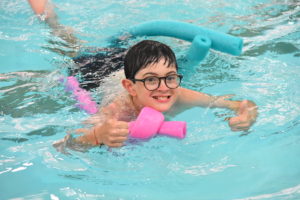
ATHLETIC ACTIVITIES
- All campers and staff must be wearing proper footwear and socks.
- All campers and staff must wear proper protective gear as required in the specific activity.
- Playing sports with kids is one of the best ways to connect with them. Remember, this isn’t a time for you to show off your athleticism, it should be about helping the kids to learn skills and develop their sportsmanship, which can be a struggle for many of (Hint: A strong counselor will interact to help their campers to have fun—not to win)
WALKING AROUND CAMPUS
Campers are not permitted to walk around campus unaccompanied. If a camper must go to the health center, a staff member must accompany them. If you are not able to accompany a camper to the health center, contact a senior staff member to take them. Campers may come to the office on their own only by permission of Senior Staff.
DORMITORY
- Campers must keep dorm room doors open at all times, except for brief periods of time when they are changing. Staff should model this behavior with their rooms as well. If campers have privacy issues about dressing, they can get changed in the bathroom.
- Campers are NEVER to be left in the dorm unsupervised under any circumstances.
- Campers may not go to another dormitory floor without Campers may not go to any other dorm aside from their own without permission and supervision.
- Campers may not leave the dorm without permission from a
- Female staff should never be in the dorm room of a male staff member (and vice versa). This undermines your credibility as a staff member.
- Campers are not permitted in staff dorm rooms.
- Staff must keep their rooms clean as an example for the campers.
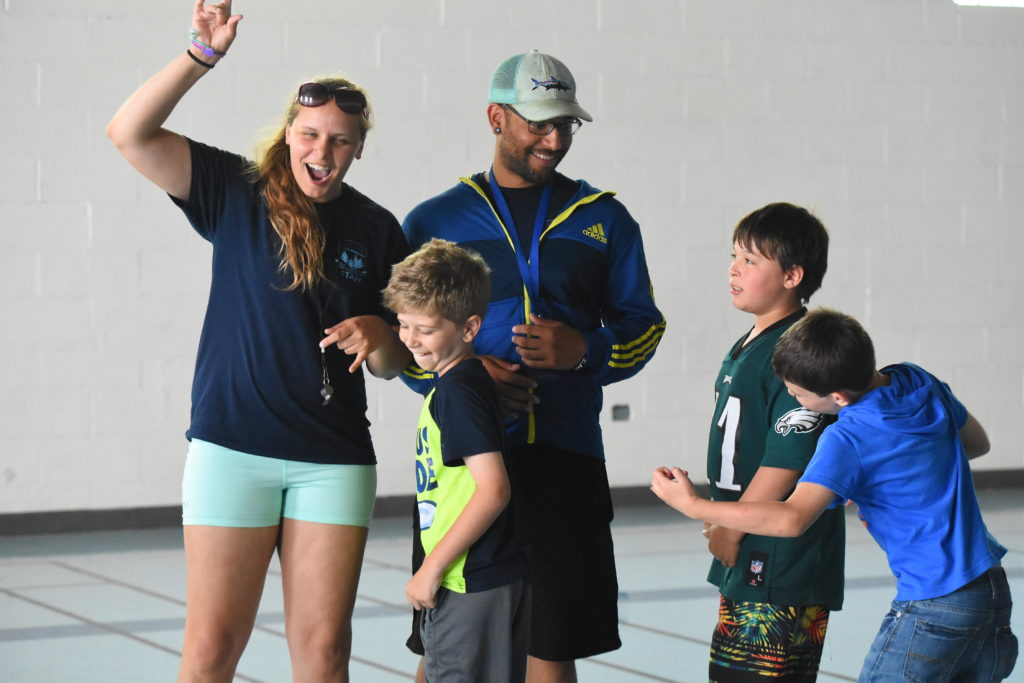
SOCIAL MEDIA (SUCH AS FACEBOOK, INSTAGRAM, TIKTOK, SNAPCHAT, TWITTER, ETC.) CAMP SEQUOIA’S SOCIAL NETWORKING POLICY
Camp Sequoia recognizes that social networking is part of today’s society and that it is a way for people to communicate. At the same time, we want to make sure that the use of social networking sites by Sequoia staff does not create any legal or reputational problems for the camp. We ask that our staff exercise discretion, are mindful of their actions, and are thoughtful and respectful of the anticipated audience of the content. To help guide you in your use of social networking sites, we have created this Social Networking Policy. This Policy will help you open a respectful, knowledgeable interaction with people on the Internet and also protect the privacy, confidentiality and interests of Camp Sequoia, other camp staff and our partners and campers. Please read it carefully.
We understand that there is a difference between social networking activity where you are identified as a member of the Sequoia community and private conversations that are outside of the camp community. While this policy is directed to activity where you are identified as a member of the Sequoia community, you must also recognize that even private postings may become public, can reflect badly on Camp Sequoia and may result in disciplinary action by Camp Sequoia. Given the nature of the children’s camp business, you must be mindful of your responsibilities and the impact your words and actions have on the camp community.
Accordingly, please refrain from posting the following (and this is not an exhaustive list):
- Any pictures of our campers: never post anything (including name, image or likeness) of a minor, even if permission is granted.
- Inappropriate material (e.g. photos, language, inflammatory statements);
- Harassment (no derogatory, offensive or threatening comments or language);
- Proprietary information about Camp Sequoia or anyone else;
- Confidential information;
- Misrepresentation, untruths, “alternative facts”;
- Derogatory statements about Camp Sequoia
We strongly urge you not to correspond with campers or their parents via social media after the camp season. Amongst other things, it breeds a familiarity and lack of structure, which can inhibit your ability to do your job most effectively, and our ability to run a successful, cohesive camp in future seasons.
DAILY RESPONSIBILITIES
WAKE UP
Campers who wake up early must stay in their rooms until 7:00 A.M. during which they can be reading, listening to music, or doing a quiet activity. After 7:00 A.M. campers may be in the common room or their bedroom only. Campers should not go into other camper’s rooms in the morning.
Staff should wake up at least 15 minutes before their campers. On each floor, there will be a designated “early riser” staff member who will be the contact person in case the need arises. It is a collective responsibility to help wake the campers up and make sure they are getting ready for breakfast. It is particularly important that each camper goes through their morning hygiene routine and is dressed appropriately for the weather. One counselor always needs to be in the bathroom monitoring to make sure everyone is doing what they need to do to get ready.
You will come to know which of your campers take longer to get ready than others. You will work out a system with your co-counselors as to supervising campers to make sure they are getting up and doing what they need to do. Keep in mind that rushing our campers typically does not make them move faster. We cannot have campers arriving to meals late, as we dispense medications at meals and the dining room staff is on a very tight schedule.
You may need to wake up certain campers earlier than others if they are very slow in the morning. Getting campers started on a good routine within the first few days of their arrival will help them be more successful and ultimately this established routine will make your life much easier.
A camper wearing pants and a long sleeve shirt to breakfast because they tell you they have no other clean clothes is not acceptable. Keep in mind that many of our campers will put very little effort into finding missing clothes. They will need your help in managing these types of things. It is also important to make sure that campers wear new clothes each day.
MEALS
Campers and Staff will enter the dining room. Nurses will come to tables and ensure campers have their appropriate medications. Campers and staff sit with their assigned division during each meal. Your job will be to supervise your division of campers while they are getting food. Some of our campers need to have their food intake monitored and we need to be sure they are not taking food they won’t eat or overeating. During meals, counselors should engage in conversation with their campers. Mealtime is a wonderful opportunity for you to get to know your campers better and build your relationships with them. No books, electronics, or music is allowed by individual campers at meals.
You are responsible to make sure the campers at your table are not wandering around the dining hall. No one is dismissed from their table until a Division Leader dismisses the table. Campers and staff are not permitted to use the soda machine in the dining hall. All campers and staff (to model this behavior) must drink one cup of water before getting any other drink. Campers are not permitted to skip meals or to not eat anything. Most importantly, please don’t get into power struggles over food. Many of our campers are extremely picky eaters. Please report any camper dietary concerns to your division leader/nurse immediately.
STAYING HYDRATED-IT’S EVERYONE’S RESPONSIBILITY
It is extremely important that both our campers and staff stay hydrated throughout the day. Each summer we have had staff and campers who became sick from dehydration. The majority of our campers take medications which can cause dehydration thus we want them drinking water regularly throughout the day. We provide coolers with water at the activities and encourage campers (and staff) to stay hydrated. You may want to have your own water bottle (there are filling stations inside as well) for camp. Make sure to model good hydration for your campers.
DAILY CLEAN UP
Campers and Staff return to their rooms after breakfast for Clean-up. Each camper will clean and organize their belongings during Clean-up. Cleanup is an important time for campers to lean life skills and independence. Some campers will need step-by–step instructions broken down during this process.
All Counselors should be going into camper’s rooms during clean-up & organization to make sure that campers are doing what they need to be doing, throwing out trash, getting their things ready for the day, organizing their areas, etc. Sitting in your room or in the common room during Clean-up is not acceptable.
Please be patient with campers who have difficulty during this time. Some of our campers have little to no responsibilities at home and many of our campers have what is called executive functioning deficits. Executive functioning deficits mean that someone has trouble getting organized, planning ahead and following routines and tasks. Setting a routine and establishing expectations from the beginning of the session is key to success here.
Camper’s room Clean-up responsibilities:
- All beds are to be made as nicely as possible.
- All clothing, toiletries, games, etc, are neatly arranged.
- Dirty clothes are put away, towels and bathing suits and laid out for swim time.
- All waste baskets are emptied in trash cans.
Dorm clean up jobs:
- All items in common room are returned to their owners.
- Trash is thrown out and placed in trash bags outside the front door for Perkiomen School maintenance.
- All items in bathroom are returned to owners, trash in bathroom thrown out.
MOVING AROUND CAMP
Camp Sequoia’s program is unique in the sense that our campers get to choose most of their activities (Majors and Minors). All activities require us to meet at a central location between periods so counselors can take the campers to their next activity period. You will be told where this central location will be for your division. Campers are never to walk around camp unaccompanied unless approved by a senior staff member. Please remember to allow campers to have bathroom breaks in between periods where they won’t have bathroom access (athletics, nature, etc.)
ACTIVITY PERIODS
General Counselors will be assigned to specific activities with their division. Some General Counselors will run activities under the direction of our Senior Staff. General Counselor responsibilities during activity periods are to supervise, encourage and help campers as well as assisting the Activity Specialist. It is the Counselor’s responsibility to manage individual campers so that the Activity Specialists can run the activity.
It is easy for our campers to become distracted or to disconnect during activities so it’s very important we “reel” them back into the activity. Your goal is to address any problems and help any campers who might require additional attention so that everyone can join in the activity with your group. The campers will be excited to spend time playing with you and it will increase their willingness to participate. Remember, if you are enthusiastic, they will be too.
Activity Specialists will plan activities for their campers and lead the period. It is extremely important to structure your periods so there is time to explain what is happening, let the campers know your expectations for the activity, spent an appropriate amount of time on practicing or constructing and have sufficient time to clean up and transition to the next activity. It is extremely important to let our campers know when there are 10 minutes, then 5 minutes, then one minute left in an activity period. This helps them with transitioning to the next activity as it allows them to mentally prepare for the transition.
Programming development, lesson plans and activity planning happens well before campers arrive. Be sure to ask for help and guidance early and often.
Our campers always do best when they know what to expect ahead of time in all situations!
REST PERIOD
All campers and counselors return to their floor at Rest Period. Campers may be in their rooms or in the common room. Rest Hour is an important part of the day. You are welcome to take your campers outside to play in front of the dorm during rest period as long as your co-counselors know where you are and there is adequate coverage for all campers. The counselors are responsible for making sure campers are writing letters (on letter writing days) and in some cases help them to write. Please keep in mind that most accidents and behaviors happen at camp during these “down times” so supervision is critical during Rest Period.
- ALL STAFF ARE ON DURING REST HOUR. The climate should be relaxed and restful and quiet enough so that those who would like to write, read or sleep may do so. Music is allowed to be played quietly during Rest Hour.
- Campers must write letters to their parents twice weekly. Some campers will need supervision or direct assistance with this process. Don’t accept any excuses. Make it a pleasant chore, but make sure it is done. Stress positive remarks. Please oversee this closely, for child-parent contact is critical during camp. All letters should be handed to the Division Leaders.
- No camper activity should be scheduled in the camp at Rest Hour without prior approval of a Senior Staff member.
AFTERNOON SNACK
Afternoon snack will be held at a specific location each day. It is the Counselor’s responsibility to supervise campers during snack time and make sure the campers are throwing out any trash and not leaving their belongings behind.
FREE SWIM
You are encouraged to go swimming if you are assigned to free swim. It is your job to assist the pool staff with supervising and manage camper behaviors in and out of the pool. While campers are not required to swim, they must be in their bathing suits for free swim and have a towel with them. All campers must swim during instructional swim and counselors should plan to be in the water with them. Counselors need to escort campers to the bathroom during free swim. Please encourage your campers to swim during free swim.
SHOWERS & MAIL
One Counselor from each bunk should go to the camp office to pick up mail before returning to their floor after the final activity period of the day. All campers are required to shower every day. Some of our campers are not very mindful of their hygiene so it is your responsibility to make sure they are showering, putting on clean clothes, putting on deodorant (in the morning and after showers), brushing their hair, etc. One staff member (male) will need to be stationed in the bathroom during shower time to make sure the campers are getting in and out of the shower on time and not getting distracted, making a mess, etc.
Counselors will establish a shower schedule for campers and make sure that campers are in and out of the shower in a timely matter with appropriate supervision. Because some of our campers struggle with hygiene, they will need varying degrees of supervision during this process. Supervision might include having the camper show you that they have shampoo and soap in their shower caddy before their turn at showering. While some of our campers have privacy issues and we want to respect their privacy it is also important to understand that good hygiene takes precedence. Every summer at overnight camps there are campers who develop skin problems due to poor hygiene. Please make sure there is ample time for all campers to shower. Campers should put on clean underwear, socks and a t-shirt after showers.
EVENING MEETING
Each night after dinner we will have an all-camp meeting. During this time, you will be asked to share some positive things that you saw throughout the day pertaining to the basic social cognition concepts. Don’t worry you will learn about these during staff week. All of our campers need praise, particularly those who have low self-esteem. No compliment is ever too small. Hint: This is a good idea for your colleagues as well. Even your leadership team appreciates positive reinforcement.
EVENING ACTIVITY
Counselors will be assigned to supervise specific locations or activities. This is a time for campers to enjoy the freedom to select activities from a predetermined list of options. This is not a time when campers are allowed to be doing solitary activities (reading, listening to music, etc.). They must be engaged with other campers. We welcome new ideas and creativity at camp, and you are encouraged to create your own activities during evening activity based on your talents and interests that you can share with our campers. You’d be surprised to learn how receptive campers are to trying new things if you are enthusiastic about them.
Counselors assigned to specific activities will supervise and engage with campers. If a camper is leaving an activity for another activity a staff member must escort them. Suggestions for new and interesting evening activities are welcome. The success of the evening programs is closely linked with the enthusiasm and interest shown by all of the counselors.
SNACK
After the final period of the night or evening activity (depending on the program) campers will have snack or canteen depending on the night. Canteen is a time when campers will go to the dining hall for snack. When there is no canteen snack will be done outside of the dorm. Counselors are required to supervise campers during this time and make sure they are throwing out their trash. Please try to engage all campers during this time as it is somewhat unstructured which can be difficult for campers who do not understand how to enter social situations appropriately. Some campers will need to get medications during this time. The nurses will come around to deliver these.
BACK TO FLOOR & BEDTIME PREPARATIONS
Campers will return to their dorm with their counselors at a designated time. It is very important to keep this time as calm, structured, and routine as possible. Establish a routine for when campers will be going into the bathroom to brush their teeth etc. Do not expect most campers to remember or want to brush their teeth. As the campers prepare for bed, it is important that they follow their evening routines, brush their teeth, wash their face, empty the pockets of their clothing, and place their worn clothing in their laundry bags.
Bedtime is important! The tone should be calm and quiet on the floor. Each night we read to campers in the Freshman, Junior, and sometimes Inters divisions which helps them to quiet down and get ready for bed. When it is bedtime, please go to each camper’s room to talk with them, make sure they are getting ready for bed, etc.
If campers do not want to listen to the book, being they can be in their rooms or another camper’s room, the person you are on O.D. with should be supervising the rooms while the other person reads to the group. Homesickness or anxiety may surface during bedtime at the beginning of each session. It is important to be firm yet warm in these situations. Depending on the age of the child, it is also acceptable to rub their backs to help them relax and fall asleep. It is important to remind all campers to go to the bathroom before bed.
LIGHTS OUT
Generally, the policy is as follows:
- 8:50Freshman and Juniors in dorms(9:30 lights out)
- 9:20 Inters and Centers back to dorms (10:00 lights out)
- 9:50 Seniors/L.I.T.s back to dorms (10:30 lights out)
Keep in mind: If you put your campers to bed too early, they will wake up too early!
LAUNDRY
Once per week campers are required to change their bed linens and put clean ones on their bed. It is extremely important that all campers’ dirty laundry go in their laundry bags and brought out on laundry day. We will discuss counselor laundry logistics during staff week. All staff will help campers to neatly put away their clean clothes (which are returned folded already from our laundry service). Staff laundry IS NOT sent out to our service. There are several options for staff including onsite and a couple of local laundry options.
TRIP DAYS
All campers and staff must wear clean Camp Sequoia t-shirts on trip days. All Staff must remember that each staff member must actively supervise the campers on trips. You will be asked to break down your campers into smaller groups for some trips to make walking around more manageable. Your biggest job is to count, count again, and recount campers to make sure you know where they are and that they are safe and well supervised. The supervisory responsibility is paramount during trips and staff must use their utmost best judgment and remind campers to do so as well.
- In the event a camper is missing or lost, a Senior Staff should be notified IMMEDIATELY.
- If a medical emergency arises, please contact a Senior Staff immediately.
Please help your campers to make smart decisions with their money while on trips. For example, do not allow a camper to buy 4 candy bars. Campers are allowed to purchase ONE soda while on trips.
RAINY DAYS
Given the amount of indoor space available at camp rainy days do not present a significant problem for Camp Sequoia. Some activities will need to be moved inside as a result. Activity specialists should have rainy day lesson plans that they can do inside on rainy days. Activity specialists must present rainy day activity plans by the end of staff orientation.
COUNSELOR ETHICS
Loyalty to the camp and its administrators is of paramount importance. All staff should cheerfully and willingly carry out the camp policies and regulations. Their personal behavior should be worthy of emulation including clean language, and a positive, optimistic attitude. Counselors are expected to demonstrate a high level of interest not only in their own program offerings but in the total camp offering as well. Staff should work together as a team realizing that there will be many times during the camping season when the “give and take” principle will need to operate to ensure the smooth operation of the total program. Some helpful hints follow:
- Seek a sympathetic understanding of the background, training, and ability of each other.
- Be friendly, loyal, and patient with each other, overlooking trivial things. Remember that we are all going to be spending a lot of time together. It’s very easy at overnight camp to get annoyed with co-workers. We cannot solve a problem we don’t know about. If you have a difficulty with something, open a professional dialogue. Or, if you are unwilling to do that, aim for forgiveness.
- Be considerate of the equipment and property of others.
- Make a real effort to avoid getting into negative talk or unfavorable criticism of each other. None of us do our jobs If you ever need a reminder of this, see Brian. He will tell you a story of a mistake he has made and make you feel better.
Please keep in perspective that complaining and/or blaming others is useless. There are always things that can be improved. Please be constructive and seek solutions by suggesting things in a professional manner if you feel the need.
RELATIONSHIPS AT CAMP
Camp Sequoia understands that the nature of a residential community is one where you are likely to make friends, and build meaningful relationships with your co-workers. However, under no circumstances is it permissible to engage in a non-platonic relationship with someone whom you supervise or someone who supervises you. This avoids any potential power dynamic concerns and maintains our focus on doing meaningful and positive things for kids.
INVENTORY PROCEDURES
Inventories of all facilities, non-expendable equipment and expendable supplies will be conducted before camp opens, at the end of every session, and during camp closure. Accurate and timely inventories are important tools for the proper administration of the overall camping program since they are used for budgetary planning, justification for insurance claims, and are the basis for purchasing both for the current season and next summer. If you need any supplies or equipment for your program during the summer, let the Program Director know well in advance so we can plan accordingly.
Please note that final paychecks will be handed out only after all inventory is handed in and accounted for, your rooms are cleaned, all dorm rooms on your floor are inspected and any damage is reported to a Senior Staff member. We need to leave the Perkiomen School in the condition we found it or better.
And Finally……
Obviously, we could not cover every single aspect of camp in this handbook. Hopefully you will have questions prior to orientation, and we encourage you to ask them so we can discuss them prior to camp starting. We expect that all staff will have read this handbook thoroughly. We want you to feel that you are coming to Camp Sequoia well informed of our policies, procedures, and expectations. We are happy to do anything to help you do your job to the best of your ability and make this the best possible experience for kids.
We look forward to seeing you in a few weeks and know you will do an incredible job at camp this summer. Thank you in advance for being part of our staff and for the positive difference you will make in the lives of some great kids this summer. We are looking forward to a great summer working with you,
Your Camp Sequoia Leadership Team

